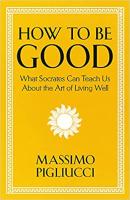
Basic Books UK (2022) h/b 262pp £20 (ISBN 9781399804936)
In this volume P., a New York Professor of Philosophy, grapples with the age-old questions of how we can live better lives and create a better society. The sub-title is somewhat misleading as, although P. starts with a detailed account of Socrates’ life and teachings and returns to him later, the book also covers the ideas and lives of a number of other thinkers throughout the ages. P. often adopts a conversational style, as if holding a discussion with the reader, and poses a number of soul-searching questions. He includes a detailed reading list for each chapter, along with footnotes and a comprehensive index.
Chapter 1 is essentially an introduction and P. immediately poses the question as to whether we and the leaders of our society can become better human beings. He reminds us of the classical ‘cardinal virtues’ and the debate about whether these can be taught. His second chapter focuses in detail on Socrates and, in particular, his relationship with Alcibiades and efforts to educate him. He explains that, according to Socrates, the real problem with many politicians is ‘They are fools, affected by a particular kind of ignorance … blinded by their own unwavering conviction that they actually know what they are doing.’ P. comments that not much has changed today.
Chapter 3 gives a very detailed description of Alcibiades’ character and his career, exposing his weaknesses and treachery. P. concludes that ‘Socrates failed in his attempt to instil virtue in Alcibiades’, something that he had predicted almost at the outset. This prompts P. to devote Chapter 4 to a more comprehensive study of Socrates’ life and philosophy, drawing extensively on Plato and Xenophon. He deals well with the problem that all our sources are secondary and may reflect their authors’ views rather than what Socrates actually said or thought.
In his next chapter P. looks at case studies of classical philosophers who attempted to teach rulers to become virtuous statesmen. The Sicilian philosopher, Dion, encouraged Plato to come to Sicily to influence the tyrant Dionysus I. Although this did not end well, Plato later returned to Sicily to perform the same service to Dionysus II, who became interested in philosophy, but unfortunately failed to understand it. Similarly, Aristotle taught the teenage Alexander the Great for three years. Initially, Alexander seemed to have understood and appreciated his tutor’s philosophy, especially the political part, but, once he was at the head of an all-conquering army, he changed somewhat. Seneca’s relationship with Nero provides P.’s final example. Chapter 6 considers ‘philosopher kings’, beginning with an in-depth study of Cato and his relationship with Sulla, followed by Marcus Aurelius, the only ‘Good Emperor’, and finally Julian the Apostate.
P. then moves on to more recent times in his consideration of the relationship between philosophy and politics. He begins with Plato’s Republic, but moves on to John Stuart Mill, Machiavelli, Locke, Voltaire and Kant. In his final chapter P. asks ‘What is character?’—his key to goodness—drawing on the work of Christian Miller. He identifies three behaviours which can improve us: adopting role models to act as our pattern; purposely seeking out situations that inspire us to do well, while avoiding those that in conflict with our ethics; being mindful and getting to know who we ourselves are and what makes us tick. After discussing the two kinds of philosophers which have existed since earliest times, P. lays out a course of self–study for his readers in eight modules.
This is a thought-provoking and very readable book, accessible to those with little or no classical knowledge. It not only provides a detailed examination of the lives and works of key ancient philosophers, but also grapples with the universal problems of how we should best live our lives today.
Marion Gibbs
